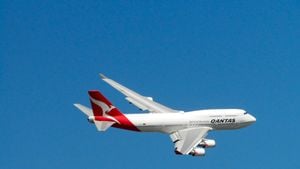Mark Butler, Australia’s Federal Health Minister, found himself on the hot seat during a recent interview on Sunrise, where he acknowledged enjoying complimentary flight upgrades. This admission coincides with growing scrutiny over Prime Minister Anthony Albanese’s involvement with Qantas, particularly following revelations from a book detailing the close ties between the prime minister and former Qantas CEO Alan Joyce.
Butler was questioned by Sunrise host Nat Barr about his travel perks, as the government faces backlash over Albanese’s alleged request for upgrades from Joyce after blocking Qatar Airways’ expansion bid. The Prime Minister has been accused of creating questionable connections between government decisions and personal benefits.
“I have declared all of the upgrades,” Butler explained, confirming he received four upgrades over the past decade, which were declared “in accordance with the rules.” He admitted to being upgraded during one of his flights and maintained the legitimacy of his actions.
Barr pressed Butler on the timing of these upgrades, implying there’s potential impropriety when they happen after significant government decisions affecting airlines. “Isn’t it dodgy?” Barr challenged. Butler responded defensively, asserting, “We fly all the time... it’s something common after decisions by governments.”
The tension heated up as the minister was pressed on Albanese’s direct communication with Joyce. Butler defended the Prime Minister, stating he had complied with existing rules concerning upgrades and has addressed the public on this matter thoroughly.
Meanwhile, Opposition Leader Peter Dutton has urged Albanese to refer himself to the National Anti-Corruption Commission, citing his perceived impropriety related to these upgrades. Albanese, facing demands for transparency, has dismissed the call for referral, emphasizing each engagement with Qantas was properly declared.
Albanese's troubles deepened this week when excerpts from Joe Aston’s upcoming book, The Chairman’s Lounge: The Inside Story of How Qantas Sold Us Out, painted a troubling picture of the airline's operations and its close ties with government officials. Aston alleges Albanese may have benefited from numerous upgrades since 2009, dating back to his tenure as Transport Minister.
On another front, Naama Carlin, diagnosed with breast cancer during her pregnancy, recently garnered significant media attention for crowdfunding $62,000 to procure life-saving medication. This emerged as triply significant because it highlights the challenges faced by cancer patients when health systems fail to cover necessary treatments.
Carlin's diagnosis hit hard—she was just 29 weeks pregnant when she learned she had triple-negative breast cancer, which is rare and often more aggressive than other types. After being advised to take Keytruda, her oncologist informed her it wasn’t yet listed on the Pharmaceutical Benefits Scheme (PBS), prompting her to seek financial help through crowdfunding.
The situation exemplified the broader struggles many face when confronting serious medical challenges. Dealing with not only the physical toll but also the financial burden can be overwhelming, especially for younger women often precariously employed and without substantial assets to rely on.
Carlin spotlighted the urgent need for effective treatments as her breakthrough came when Keytruda was finally included on the PBS. This allows eligible patients to access the drug at a much reduced cost of about $31.60, significantly alleviating financial pressure on those affected.
Dr. Ginni Mansberg explained the importance of Keytruda, detailing its function to boost the body’s immune response against cancer. She highlighted the difference it could make for triple-negative breast cancer patients, where survival rates showed notable improvement due to this medication.
Meanwhile, the media industry dealt with its challenges too. Senator Jane Hume expressed support for the abolition of the broadcast tax, echoing sentiments made by Anthony De Ceglie, the 7NEWS boss. During his speech to the Melbourne Press Club, De Ceglie criticized the Albanese government’s financial burdens on Australian broadcasters, which collectively amount to $45 million annually.
The tax was originally established to regulate profits from broadcasters but has now become somewhat redundant, particularly as free-to-air networks still bear its cost. Hume aligned with De Ceglie’s view, underscoring the disproportionate burden it places on legitimate news outlets.
The rise of social media platforms has complicated the media ecosystem, with companies like Meta contributing to the dissemination of questionable information without any obligation to pay journalism taxes. Hume referenced the challenges posed by these social media companies, which exacerbate existing issues within the news industry.
The necessity for meaningful compensation for credible news outlets is emphasized through the backdrop of declining ad revenues, increasing operational costs, and the changing media consumption behaviors of the public.
Meanwhile, O’Neil, the Communications Minister, contended the protection of journalism was imperative amid these changes but dismissed the notion to scrap the tax, explaining her ministry's focus is instead on addressing the general issues facing media companies.
Adding to the challenging backdrop, Australians have faced multiple new events, including the aftermath of police investigations following tragedies and accidents, underscoring the need for responsible reporting and the outcomes of community safety measures.
Recent incidents have shed light on safety concerns within the community, raising alarms about how incidents involving violence or negligence highlight the challenging balance between maintaining public safety and freedom. Further reports indicating the struggles within Australian journalism indicate the public’s trust is pivotal as respective developments continue to progress, whether it’s political or social news.
Carlin’s case stands as one of resilience and the communal effort to fund life-saving treatments—her advocacy has become part of the conversation around healthcare access and affordability, impacting legislation and public perception. Likewise, the media's call for action against the archaic broadcasting tax showcases how journalism aims to remain viable and factual as it navigates through complex societal structures.



